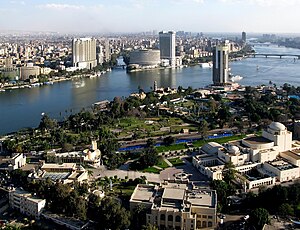 Image via WikipediaOver the last few weeks, I have been watching events in Egypt unfold with optimism and hope. Although it has been over twenty years since my last visit to Cairo, I have such fond memories of the people and their extraordinary hospitality. This country seems to be an excellent environment in which to develop a new prototype for balanced economic, political and social reform.
Image via WikipediaOver the last few weeks, I have been watching events in Egypt unfold with optimism and hope. Although it has been over twenty years since my last visit to Cairo, I have such fond memories of the people and their extraordinary hospitality. This country seems to be an excellent environment in which to develop a new prototype for balanced economic, political and social reform.Conventional wisdom tells us that social and political democracy is not necessarily a strong first step to the opening and democratization of markets. We have the case of Russia as a relatively current example of the challenges of managing market expansion in a burgeoning democracy. Similarly, many would argue that the market reforms in China have been successful although political and social reform has happened at a much slower pace.
It is no doubt easier and quicker to implement reforms (some of which will no doubt be painful) under an authoritarian structure. However, more often than not markets developed under those conditions benefit only a handful of players (the ultra wealthy, political figures and multinational corporations). This type of reform rarely trickles down to a broad base. These types of regimes tend to build power and resources and get complacent about the larger issues of the country. It is easy to see how Chinese style economic reform has succeeded in some ways but has failed in others.
The challenge is that free markets actually require a “container” in which to function. The “container” includes structures like regulations and laws, without which free markets start to look more like the lawless frontiers of the Wild West. Multinational corporations prefer a stabile environment in which to invest and create infrastructure for its businesses. However that is not always in the best interests of the social and political freedoms of the general populace.
India is more of a middle ground as an example of a more mature democracy expanding its market opportunities. It does take time for a popular political movement to establish the infrastructure for extended economic development. Typically education and training are significant barriers. The good news for Egypt is the many of its demographic markers are similar to India’s. This is a highly literate, young population that actually has almost twice the urban population (as a percentage of total) as India does. Developing a soft infrastructure similar to an India will provide a stronger platform for reform and expansion. Innovation and new technologies arise in an environment in which individuals are empowered to pursue the opportunities of entrepreneurship.
The energy of transformation has been unleashed in the Middle East/North Africa and can no longer contained but there are an infinite number of ways in which this dynamic can unfold. Egypt will no doubt have its opportunity over the next few months and years to chart its own course of reform. The key for Egypt will be to find leadership that can navigate the challenges of translating multiple viewpoints into emergent policies that will help Egypt endure as a regional and global leader.
And unless we feel self satisfied, make no mistake, our democracies in the West are facing comparable demands for economic, political and social reform albeit in different clothing. Any economic system that supports a widening gap between the richest and poorest segments of the population is NOT tenable. And so the question in front of us is how do we reframe the science of economics for a new paradigm in which our foundational assumptions no longer adequately describe the challenges facing us?
Related articles
- Egypt: The Road Ahead (cbsnews.com)
- Egypt revolt could help spread democracy says Blair (independent.co.uk)
- What Egypt's revolt means (sfgate.com)

No comments:
Post a Comment